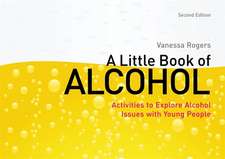Technologies of Sexiness: Sex, Identity, and Consumer Culture: Sexuality, Identity, and Society
Autor Adrienne Evans, Sarah Rileyen Limba Engleză Hardback – 25 sep 2014
Preț: 465.56 lei
Preț vechi: 574.54 lei
-19% Nou
Puncte Express: 698
Preț estimativ în valută:
89.08€ • 93.35$ • 73.64£
89.08€ • 93.35$ • 73.64£
Carte tipărită la comandă
Livrare economică 01-07 aprilie
Preluare comenzi: 021 569.72.76
Specificații
ISBN-13: 9780199914760
ISBN-10: 0199914761
Pagini: 184
Dimensiuni: 236 x 155 x 18 mm
Greutate: 0.39 kg
Editura: Oxford University Press
Colecția OUP USA
Seria Sexuality, Identity, and Society
Locul publicării:New York, United States
ISBN-10: 0199914761
Pagini: 184
Dimensiuni: 236 x 155 x 18 mm
Greutate: 0.39 kg
Editura: Oxford University Press
Colecția OUP USA
Seria Sexuality, Identity, and Society
Locul publicării:New York, United States
Recenzii
Technologies of Sexiness locates the contemporary preoccupation with female sexual confidence and desirability within the growing dominance of consumerism, postfeminism, and neoliberalism. Evans and Riley have written an engaging and accessible book that will be essential reading for students interested in transformations of intimacy, changing gender relations, and debates about the sexualization of culture."
This book offers an illuminating blend of social psychology, media studies and gender and sexuality theories to develop the innovative conceptual lens of technologies of feminine sexiness. Through detailed analysis of both contemporary postfeminist, sexualised media contexts and women's experiences, it demonstrates the psychosocial, performative play of a heterosexualized, otherizing gaze amongst women. This gives us a much needed insight into the psychology of new femininities through rich empirical research accounts, which are often missing from the abstract, theoretical or solely textual evocations of postfeminist media cultures. This book is a must-read for anyone interested in contemporary debates on postfeminism, femininity, heterosexuality and subjectivity.
Technologies of Sexiness: Sex, Identity, and Consumer Culture offers two pieces to understanding women's sexuality in British (and by extension, Western) consumer cultures. First, Evans and Riley offer a brilliant analysis of how neoliberalism, postfeminism, and consumerism come together in young women's self-sexualization. The linkages of feminist thinking to neoliberalism have begun in other recent research (Fitz, Zucker, & Bay-Cheng, 2012), and the addition of consumerism is quite illuminating and worthy of the attention of feminist scholars. Second, they offer an intriguing qualitative analysis of two groups of women's thinking that [...] is worth researchers' attention and future work.
Technologies of Sexiness makes a very welcome and productive contribution to work in this area. There is so much repetition and 'stuckness' in contemporary academic writing about gender -- this was an absolute delight to read for its rejection of that and its determination to do something different.
Technologies of Sexiness is an important work that should be widely read.
I think Evans and Rileys insightful analysis of the technologies of sexiness helps coalesce a growing body of research that together argue that a merger of neoliberalism, postfeminism, and consumerism does not serve individual women well.
This book offers an illuminating blend of social psychology, media studies and gender and sexuality theories to develop the innovative conceptual lens of technologies of feminine sexiness. Through detailed analysis of both contemporary postfeminist, sexualised media contexts and women's experiences, it demonstrates the psychosocial, performative play of a heterosexualized, otherizing gaze amongst women. This gives us a much needed insight into the psychology of new femininities through rich empirical research accounts, which are often missing from the abstract, theoretical or solely textual evocations of postfeminist media cultures. This book is a must-read for anyone interested in contemporary debates on postfeminism, femininity, heterosexuality and subjectivity.
Technologies of Sexiness: Sex, Identity, and Consumer Culture offers two pieces to understanding women's sexuality in British (and by extension, Western) consumer cultures. First, Evans and Riley offer a brilliant analysis of how neoliberalism, postfeminism, and consumerism come together in young women's self-sexualization. The linkages of feminist thinking to neoliberalism have begun in other recent research (Fitz, Zucker, & Bay-Cheng, 2012), and the addition of consumerism is quite illuminating and worthy of the attention of feminist scholars. Second, they offer an intriguing qualitative analysis of two groups of women's thinking that [...] is worth researchers' attention and future work.
Technologies of Sexiness makes a very welcome and productive contribution to work in this area. There is so much repetition and 'stuckness' in contemporary academic writing about gender -- this was an absolute delight to read for its rejection of that and its determination to do something different.
Technologies of Sexiness is an important work that should be widely read.
I think Evans and Rileys insightful analysis of the technologies of sexiness helps coalesce a growing body of research that together argue that a merger of neoliberalism, postfeminism, and consumerism does not serve individual women well.
Notă biografică
Adrienne Evans is a Senior Lecturer in Media at Coventry University. Her main research interest is in exploring women's contemporary sexual identities. Her current work continues in contemporary gender relations and the use of creative methods in research and teaching. She has published this work in the European Journal of Women's Studies, Journal of Gender Studies, Men and Masculinities, Teaching in Higher Education, and Feminism and Psychology. Sarah Riley is a Senior Lecturer in the Psychology Department at University College Wales, Aberystwyth. Her research takes a social constructionist approach to explore issues of identity in relation to gender, embodiment and youth culture. She has published widely in journals including Feminism and Psychology, British Journal of Social Psychology, Sociology and Journal of Youth Studies. She co-edited Critical Bodies: Representations, Identities and Practices of Weight and Body Management (Palgrave Macmillan, 2008), and Doing a Qualitative Research Project (Sage, 2011).





















